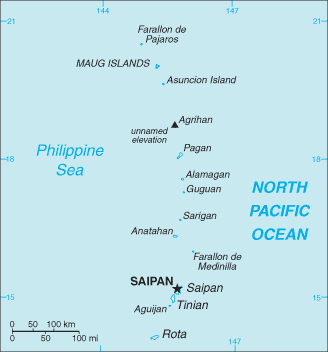Oceania > Northern Mariana Islands: Weather, Map, Costs and Travel Guide

Northern Mariana Islands : When and where to go?
Click on a city for complete climate and weather tables
| Town | Jan | Feb | Mar | Apr | May | June | July | Aug | Sept | Oct | Nov | Dec |
| Saipan |  |  |  |  |  |  |  |  |  |  |  |  |
Northern Mariana Islands: Climate & Weather
The climate is tropical, with warmth and humidity throughout the year. From December to June, there is a slightly warmer and less humid season, and from July to November precipitation and heat dominate. Fortunately the trade winds moderate the high temperatures (between 28 and 31 ° according to the seasons).
Between May and November, the archipelago can experience typhoons and tropical cyclones. The most pleasant period to visit the Marianas is between January and April, February and March being the most beautiful months.
Sea water never falls below 27 ° C.
Weather today

Light Rain
Wind: 5 km/h
Precipitation forecast: 2,8 mm
> Full report and 7-days forecast
Data updated at 09:53 (local time)
At that time, the weather was:
 25 °C / Partly Cloudy
25 °C / Partly Cloudy
Northern Mariana Islands: Map

Sponsored links
What to do in Northern Mariana Islands
Also for those interested in history, Banadero Caves with the tanks and cannons of World War II and monuments to the memory of its victims on the way to Marpi Pathway, and for a history of the archipelago , The CNMI Museum of History and Culture. For nature lovers, there are several botanical gardens on the island with unique species of vegetation.
On the island of Rota, to the south, a very rich fauna and flora will welcome you, with in particular thousands of birds in the Sanctuary of Sagua'gaga.
In Tinian, you will admire the enormous lava stones engraved by a legendary chief, located in San José.
To note, some festivities not to be missed if the dates correspond to those of your stay: in June the Festival of Arts of the Flamboyant in Saipan, highlighting the local creations, happening at the time of the flowering of these sumptuous trees; In August the Jazz Festival invites famous artists from all over the world.
Besides the pleasures of the beach and idleness, you can practice many nautical activities like windsurfing, fishing or diving, but also golf and hiking.
Northern Mariana Islands: The basics
The current currency is the dollar (USD).
Transport: We arrive by plane to the Mariana Islands from Japan or Taiwan, or from the USA via Guam.
Getting around: There is no public transport but taxis are quite expensive. The best thing is to rent a car. Between the islands, there are regular boats.
Health: No vaccine is mandatory, but it is prudent to have up to date universal vaccinations, and it is better to protect against mosquitoes.
Safety: There are no serious security problems, just a few possible flights, quite possible to avoid by following the basic rules.
Shopping: Do not miss the Garapan market where you can find many handicrafts.



